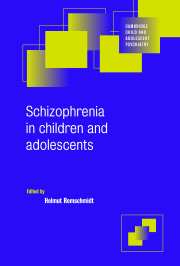Book contents
- Frontmatter
- Contents
- List of contributors
- Preface
- 1 Childhood psychosis and schizophrenia: a historical review
- 2 Definition and classification
- 3 Epidemiology of early onset schizophrenia
- 4 Childhood schizophrenia: developmental aspects
- 5 Diagnosis and differential diagnosis
- 6 Genetic aspects
- 7 Neurobehavioral perspective
- 8 Psychosocial factors: the social context of child and adolescent onset schizophrenia
- 9 Treatment and rehabilitation
- 10 Course and prognosis
- Index
4 - Childhood schizophrenia: developmental aspects
Published online by Cambridge University Press: 23 October 2009
- Frontmatter
- Contents
- List of contributors
- Preface
- 1 Childhood psychosis and schizophrenia: a historical review
- 2 Definition and classification
- 3 Epidemiology of early onset schizophrenia
- 4 Childhood schizophrenia: developmental aspects
- 5 Diagnosis and differential diagnosis
- 6 Genetic aspects
- 7 Neurobehavioral perspective
- 8 Psychosocial factors: the social context of child and adolescent onset schizophrenia
- 9 Treatment and rehabilitation
- 10 Course and prognosis
- Index
Summary
Introduction
Changes in our understanding of childhood onset schizophrenia over the past century have increasingly reflected an awareness of the importance of developmental factors in the diagnosis of this, and indeed all, psychotic conditions of childhood. There have been marked changes in the way schizophrenia of childhood onset is conceptualized and diagnosed (Werry, 1996). Early notions of a fundamental continuity of schizophrenia over the life span have been modified as data have suggested important differences, as well as similarities, in the manifestation of this condition at different ages (Volkmar, 1996a).
In his ground-breaking work on schizophrenia, Kraepelin noted (e.g., 1907) that the condition had its onset in childhood in some cases. Attempts were made, e.g., De Sanctis (1906), to denote childhood onset psychosis specifically but, with a few exceptions, e.g., Potter (1933), the terms childhood psychosis and childhood schizophrenia became interchangeable. This occurred even though psychotic conditions were much less common than in adults and were even more difficult to characterize. Differences in diagnostic approaches and theory also led to the over- (or under-) emphasis of certain aspects of the condition, e.g., the centrality of a deteriorating course, of disturbances in thinking or other specific pathognomonic symptoms were variously emphasized.
Initial attempts to understand psychotic processes were often developmental in nature, e.g., Freud and his early followers assumed a basic continuity between psychotic processes and early development in which the psychotic process was assumed to represent regression to earlier and “primitive” levels of functioning.
- Type
- Chapter
- Information
- Schizophrenia in Children and Adolescents , pp. 60 - 81Publisher: Cambridge University PressPrint publication year: 2000
- 2
- Cited by

